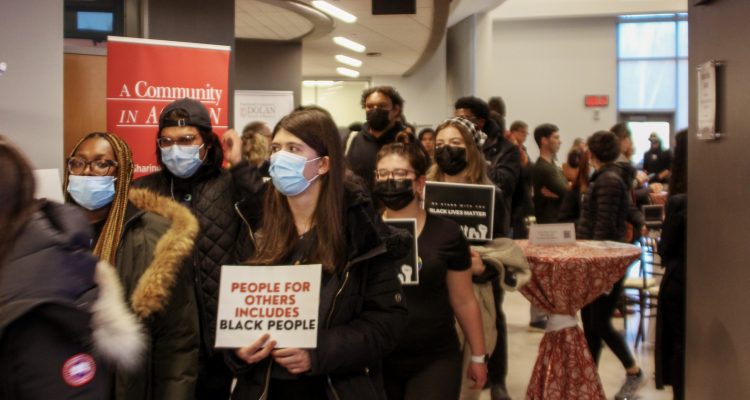We, the undersigned faculty of color, are deeply disappointed by the administration’s decision to remove the Black Lives Matter flag from the front window of Counseling & Psychological Services, a place where students seek acceptance and help at a stressful time.
Our shared mission, as a Jesuit Catholic institution of higher learning and enshrined in the University’s Mission Statement, asks that we develop “a greater sense of community, a sense that all of our members belong to and are involved in the University, sharing common goals and a common commitment to truth and justice, and manifesting in … the common concern for others.”
We fear that the removal of the flag represents a betrayal of the University’s commitment to building a truly inclusive community committed to the above-stated, shared goals of social justice and common concern for others.
As reported in The Mirror, the administration evidently chose to remove the flag, “out of concern that it may make some people uncomfortable.” This statement, we believe, is extremely troubling insofar as it appears that the administration prioritized the personal freedoms and comfort of “some” over others, grossly disregarding the experiences of many of our Black students (who already grapple with unique challenges of social exclusion) as well as other underrepresented student and faculty groups and their allies, many of whom view the BLM flag as a symbol of hope and inclusion.
The removal of the BLM flag, a symbol of one of this nation’s most salient social justice movements in the twentieth-first century, is incongruent with the University’s expressed “commitment to truth and justice.” As we incorporate social justice more meaningfully into our new Magis Core, we should point out that the BLM flag symbolically refers not merely to a particular set of activists or a single organization, but has come to signify a larger and indisputable truth: “Black Lives Matter.” The fact that the criminal legal system has yet to embody this truth is why this statement is a social justice issue. The tone of the administration’s explanation for removal of the flag regrettably mirrors its callous description of the murders of Ahmaud Arbery and George Floyd as “unfortunate deaths,” individual events unconnected to broader, historic and ongoing issues of systemic violence and exclusions. In this case, it appears from The Mirror article, that the University administration chose “standard practices” and “brand consistency” over our “commitment to truth and justice,” over structural understandings of social justice, as well as over building meaningful links between different groups across campus.
In fact, the question of how to address the issue of the BLM flag was a missed opportunity on the part of the administration to engage in a small but important act of social justice, in that administrators could have worked with Counseling & Psychological Services “to follow necessary approvals” by exploring alternatives to hanging it on the window, rather than requiring its outright removal. As an act of social justice, it could have demonstrated the administrations’ commitment to shared dialogue and mindful action aimed at developing workable, thoughtful, solutions that better reflect our institutional Jesuit values.
We are concerned that this incident is a part of a wider pattern that reveals a worrying state of affairs on our campus. We fear that the distance between our stated ideals and the reality on our campus is turning into an unbridgeable chasm that further undermines our efforts, as faculty and members of the university community, to bring life to the University’s Mission and Identity. In order to rebuild trust and alter our current trajectory, we demand a full and honest accounting of what has transpired, of where we stand currently, and of what is to be done. As an institution, we can and must do better.
We want to express our appreciation for and support of all of our students and especially students of color and other underrepresented student groups during this challenging time. The above statement was written prior to the “A Community in Action: Sharing Our Work In and Commitment to Diversity and Inclusive Excellence” event. We are incredibly proud of our students who participated in the silent protest at the event and hope to continue engaging with them as we move forward.
Signatories:
Rachelle Brunn-Bevel (Faculty Chair for Inclusive Excellence), Claudia Calhoun (Assistant Professor of Visual and Performing Arts), Nicholas Kapoor (Visiting Instructor of Mathematics), Eugenia Kim (Adjunct Professor, MFA in Creative Writing Program), Dilani Perera (Professor, Counselor Education), Martin Nguyen (Professor, Religious Studies), Stephanie Storms (Associate Dean and Associate Professor, Educational Studies and Teacher Preparation), Tanika Eaves (Assistant Professor, Undergraduate Social Work Program, Egan School), Silvia Marsans-Sakly (Associate Professor of the Practice, History and Islamic World), Ashley Byun (Associate Professor of Biology), Shannon King (Associate Professor of History and Director of Black Studies), Olivia Harriott (Associate Professor of Biology), Sunil Purushotham (Associate Professor of History), LaTasha Smith (Assistant Professor, Family Therapy and Social Work), Jiwei Xiao (Associate Professor, Modern Languages & Literatures), Kris F Sealey (Professor, Department of Philosophy), Stephaney Morrison (Associate Dean and Associate Professor, Counselor Education), Jessica Alicea-Planas (Associate Professor, Egan School of Nursing and Health Studies), Gwen Alphonso (Associate Professor of Politics and [Interim] Director of American Studies), Clarence Hardy (Associate Professor of the Practice, Religious Studies), Mehmet Cansoy (Assistant Professor, Sociology and Anthropology), Danke Li (Professor, Department of History), Sergio Adrada Rafael (Associate Professor, Modern Languages and Literatures), Pierre Orelus (Associate Professor, ESTP), Wen Zhao (Assistant Professor, Communication)


Leave a Reply